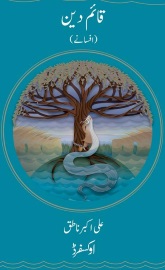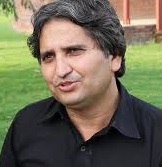قائم دین
علی اکبر ناطق
|
Ali Akbar Natiq has now published a book of short stories in Urdu. After reading his collection in Urdu it can be said that though he is diversifying in his expression, he remains essentially a poet. It is actually his poetic vision that has been translated into his short stories. It is difficult to explain how the poet or poetry works but the intuitive ability in the poet to create a metaphor, very exact and well finished yields to an understanding which actually lies in its interpretation of his very closely knit creation. As compared to a form, extremely tightly knit, the short story or fiction operates in a different manner. The metaphor is more stretched out, spread and lay over a number of parts and lends itself to readier explanations that may be descriptive, and in detail, rather than immersed in the mysteries of being cryptic. Fiction does not truly idealise an expression that demands very close knitting but may welcome a style that builds its environment, locale and situation by an additive, incremental approach, a piling upon so to say. This offers an opportunity to state the tiny and the inconsequential, the minute, less important and the left out in the writing of the novel or the short story in the process of faithfully capturing the locale, the ethos, which may be just as important as the ones that are focussed on and mulled over endlessly. The intuitive ability of the poet is much evident in the afsanas of Ali Akbar Natiq because he does not indulge in explanations, descriptions or in elongated pieces where a situation is captured, for want of a better word, a more externalised manner as compared to the intense internalised working of poetry. Since there are hardly any pieces that dwell on description of characters and the locale that he is writing about, he may have missed out on one of the essentials of writing fiction. But that does not mean there is only a singular way of writing fiction, particularly short stories. There are as many ways and styles as there are writers and many poets too have attempted to write fiction and quite successfully too. The attributes of poetry should be traced and tracked down in Natiq’s writings and made a virtue of because they contain a dimension that add to our understanding of the way men/women interact with society and with each other. The short stories are short, really short and are more in the nature of epigrams, and there is ample virtue to an epigrammatic expression. All the stories are located in the rural setting and add to the body of writings in Urdu about the rural existence of the Punjab where the language spoken by the people is Punjabi. Perhaps there is a truth to the argument that it adds a mediated level when the characters are being sketched in a language different to what they live and breathe in but these short stories counter this sufficiently so as not to sound being written by an outsider. Despite commonality with Urdu and the almost two hundred years of cross fertilization of the two, Punjabi is a distinct language that embeds its own sensibility. The closeness of the two can also be very deceptive in offering a simple transference from one to the other. It seems that Natiq has very intimate knowledge of the problems the characters in the Punjabi villages face as well as their approach to the resolution of these problems. From Premchand, the rural locale and characters have been a preserve of Urdu fiction but it was only under the influence of the Progressive Writers that the Punjabis chose to write about the rural landscape and characters in their thrust to be more realistically rooted to the soil. Krishen Chander, Rajinder Singh Bedi and Ahmed Nadeem Qasmi wrote about the travails and hardships of the rural humanity crushed under a system that was based on the extraction of the surplus produce and these creative efforts were more successful in the short stories than many of the novels because the internalized descriptions of the local and characters is more difficult when stretched out. The perspective of the novel, especially the realistic novel, demands that the characters and the locale should be faithfully reflected. Building on concision, the resolution in the short stories is more in the nature of poetic justice and Ali Akbar Natiq escapes the charge of not being able to transfer the sensibility nurtured in one language to another. These stories have been published before but for the first time these have been collected under one cover. Natiq should continue to write fiction because it adds to his spectrum of expression. Every form has its own limitations, and exercising more than one option enhances the capacity of apprehension. This may go beyond the debate of what is more truthful and sincere, poetry or fiction, as by including the virtues of both it presents a picture that is more complete. Spectrum of Expression| Sarwat Ali | 12 Feb 2012 | TNS
کتاب میں درج ذیل افسانے شامل ہیں شریکا، شاہ مدار کی پازیبیں، بےچارگی، قائم دین، تابوت، شہابو خلیفہ کا شک، جودھ پور کی حد، کمی بھائی، نرینہ اولاد، معمار کے ہاتھ، اچھو بازی گر، مومن والا کا سفر، والٹر کا دوست، شیدے نے پگڑی باندھی اور مولوی کی کرامت۔
|

 Paperback: 106 pages
Paperback: 106 pages علی اکبر ناطق
علی اکبر ناطق